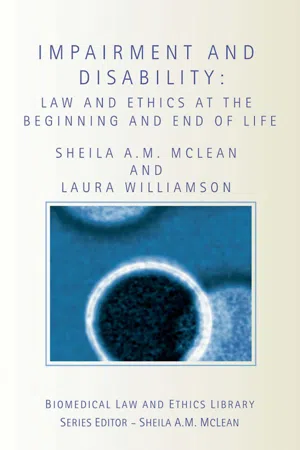
Impairment and Disability
Law and Ethics at the Beginning and End of Life
- 216 pages
- English
- ePUB (mobile friendly)
- Available on iOS & Android
Impairment and Disability
Law and Ethics at the Beginning and End of Life
About this book
This book explores legislation intended to protect the interests of people with disabilities or impairments. Considering a broad range of ethical and legal concerns which arise in issues of life, death and disability, it covers the social and legal responses to the equality rights of disabled people, focusing on those responses to:
- the right to life
- the end of life
- assisted suicide.
This work engages with contemporary debates, examines case studies and explores the problems surrounding many legal concepts within the context of disability and impairment. The authors argue that it is crucial to distinguish between unjust discrimination and differential treatment and unify the disagreements surrounding the issues by highlighting ethical ideals that should be shared by all stakeholders in life and death decisions that impact on people with disabilities.
Topical and contemporary, this book is a perfect supplementary text for students of all levels and researchers working in the areas of law, applied ethics and disability theory.
Frequently asked questions
- Essential is ideal for learners and professionals who enjoy exploring a wide range of subjects. Access the Essential Library with 800,000+ trusted titles and best-sellers across business, personal growth, and the humanities. Includes unlimited reading time and Standard Read Aloud voice.
- Complete: Perfect for advanced learners and researchers needing full, unrestricted access. Unlock 1.4M+ books across hundreds of subjects, including academic and specialized titles. The Complete Plan also includes advanced features like Premium Read Aloud and Research Assistant.
Please note we cannot support devices running on iOS 13 and Android 7 or earlier. Learn more about using the app.
Information
Chapter 1
Life, death, disability and impairment in context
Introduction
. . . there is compelling evidence from research over a number of years up to the present day that discrimination in general health services exists. This qualitative research has recorded consistent testimony from disabled people and their families about the discriminatory attitudes they face from medical professionals, and the poorer services they receive in the NHS.6
Disability: national and international responses
The law plays both an important symbolic and practical role in forming the ideological systems that legitimise specific sets of values and assumptions in society. It is, therefore, fundamental in forming the framework within which both groups and individuals interpret their participation in society. However, the traditional assumptions that the law does not discriminate have to be questioned. Although appearing impartial and neutral, the officers of the law and the judiciary are subject to the same prejudices as those from whom it is meant to stand apart.12
The Madrid Declaration takes as a starting point the analysis of the current situation of people with disabilities in the European Union . . . . It proposes a general vision, in which disabled people are not objects of charity and patients, but independent citizens fully integrated in society.13
- nothing about disabled people without disabled people;
- disabled citizens are entitled to the same rights as other citizens;
- disabled people want equal opportunities, not charity;
- creating a society for all;
- empowerment and emancipation;
- full equality and participation in all sectors of life;
- disabled people as active citizens;
- making the environment accessible;
- independent living;
- respect for diversity.
The mentally retarded person has, to the maximum degree of feasibility, the same rights as other human beings.
Disabled persons have the inherent right to respect for their human dignity. Disabled persons, whatever the origin, nature and seriousness of their handicaps and disabilities, have the same fundamental rights as their fellow-citizens of the same age, which implies first and foremost the right to enjoy a decent life, as normal and full as possible.16
. . . on the Commission and the Member States, in their revision of the Treaties at the Intergovernmental Conference, to build in a clause forbidding discrimination on the grounds of disability; . . .
. . . on Member States to include a non-discrimination clause on grounds of disability in the revised treaty on European Union, to enact a new legal basis for social programmes, and to introduce non-discrimination measures at Member State level, and to treat disability rights as a civil rights issue; . . .
- Repudiates forcefully the thesis that disabled persons, patients in a persistent vegetative state and new-born children have no unrestricted right to life;
- Reaffirms its unshakeable conviction that the right to life must be recognised in respect of every human being independently of his or her state of health, gender, race or age; . . .
- Calls on pa...
Table of contents
- Cover Page
- Title Page
- Copyright Page
- Chapter 1 Life, death, disability and impairment in context
- Chapter 2 Conceptualising disability
- Chapter 3 Towards ethical cohesion
- Chapter 4 Decisions at the beginning of life
- Chapter 5 Decisions at the end of life
- Chapter 6 Seeking assistance in dying
- Chapter 7 Countering discrimination against the ‘disabled’